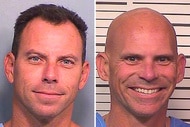Create a free profile to get unlimited access to exclusive videos, breaking news, sweepstakes, and more!
Man Exonerated After Serving Nearly 40 Years Sues Investigators And Forensic Dentist, Who Once Helped Convict Ted Bundy
Robert DuBoise is seeking unspecified damages after being imprisoned 37 years for a rape and murder he didn't commit.

For 37 years, Robert DuBoise was behind bars for a crime he did not commit.
Now the 56-year-old is suing the investigators and a forensic dentist—who once famously helped convict serial killer Ted Bundy with controversial bite mark evidence—for falsely implicating him in the brutal rape and murder of 19-year-old Barbara Grams.
“Unfortunately, Mr. DuBoise is not alone in being an innocent man exonerated after many, many years in prison and you know what happened to him is kind of emblematic and the techniques that were used in his case are not unique to his case,” Human Rights Defense Center attorney Daniel Marshall told Oxygen.com. “We think by filing this lawsuit and shining light on the problems that occurred here that led his wrongful conviction, we’re hoping … to implement changes and prevent this from happening to other people in the future.”
DuBoise was released from prison in August 2020 and fully exonerated a month later after DNA evidence from the victim’s rape kit excluded him as a suspect, according to the Innocence Project, but not before spending nearly four decades in prison. Three of those years were spent on Florida’s death row before his sentence was reduced to life in prison in 1988.
DuBoise’s attorneys are now taking aim at the city of Tampa, four police investigators and forensic dentist Dr. Richard Souviron for using what they describe as “fabricated” evidence to convict him of the 1983 crime.
“The only physical evidence implicating Mr. DuBoise was fabricated ‘bite mark’ evidence that supposedly matched Mr. DuBoise to an injury on the victim’s body. In fact, the victim’s injury was not a human bite mark at all,” DuBoise's attorneys state in the lawsuit, obtained by Oxygen.com. “This ‘bitemark’ evidence was knowingly fabricated by Defendant Souviron, a forensic odontologist, in conspiracy with Detectives K.E. Burke and John Counsman and Sergeant R.H. Price.”
Tampa Police declined to comment to Oxygen.com on the allegations, citing the pending litigation.
Souviron famously used bite mark evidence—which is considered by many criminal justice reform advocates to be unreliable—to convict Bundy of the 1979 murder of Lisa Levy, linking a mold of the serial killer’s teeth to a bite mark found on Levy’s buttocks.
Levy had been one of four women attacked at the Chi Omega sorority house at Florida State University. Levy and Margaret Bowman both died in the brutal attack.
Souviron was also a key witness in DuBoise’ 1985 trial, after investigators discovered a circular wound on Grams’ cheek that they believed was a bite mark, according to The Tampa Bay Times.
They used a mold the investigators had made themselves of DuBoise’s teeth using beeswax—which the lawsuit alleges was “scientifically unreliable”— and claimed that it matched the mark.
“In 1983, no reasonable dentist or forensic odontologist believed that bite mark molds made from beeswax impressions constituted a reliable or generally accepted basis for either identifying or excluding potential murder suspects,” the suit states.
The officers allegedly used the beeswax, which “is too soft, and therefore can neither hold its shape nor preserve fine contours or spaces between teeth,” because an officer in the Tampa Police Department at the time had a honey business on the side.
According to the lawsuit, Burke and Det. Philip Saladino—who is also named as a defendant—turned to Souviron because they knew he would “reach any conclusion about the bitemark identifications they wanted, regardless of whether the identification had any legitimate forensic or scientific basis.”
Attorneys representing DuBoise pointed to several statements Souviron made at an International Association of Chiefs of Police meeting just before the trial began.
“If you tell me that is the guy that did it, I will go into Court and say that is the guy who did it,” he allegedly said.
Marshall told Oxygen.com that he believed Souviron was “having his star turn at the moment” after Bundy’s successful conviction—which led to more investigators to consider the form of controversial evidence.
“The notoriety that went along with the Bundy case gave him some credibility that wasn’t warranted,” he said.
Oxygen.com was unable to reach Souviron to address the allegations directly.
After DuBoise was exonerated, Souviron told the Tampa Bay Times that he would not have been as certain about the bite mark evidence today.
“From a human point of view, of course, I feel terrible,” he said last year. “I played a part in his conviction. There’s no question I feel terrible.”
Grams was killed while walking home from her restaurant job in August of 1983. She was raped, beaten to death and left in a yard outside an area business.
Suspicion initially fell onto DuBoise, then 18, after an attendant at a gas station across the street from where the body had been discovered told investigators that three “boys” she identified as Robert, Bo and Ray had been “causing trouble” in the area six months before the slaying, according to the lawsuit.
“We think this was a horrific investigation,” Marshall told Oxygen.com. “Once they were on him, there wasn’t any real evidence connecting him to the crime because he didn’t do it, and so they ended up manufacturing things and, you know, clearly there’s problems with it and that’s what leads to innocent people going to prison.”
DuBoise was convicted based on the bite mark evidence and testimony from jailhouse informants.
The lawsuit alleges that Burke, Counsman and Price “fabricated evidence and withheld exculpatory evidence related to jailhouse informants, falsely contending that Mr. DuBoise confessed to the crime.”
They assert that DuBoise “never confessed to anyone because he has maintained his innocence from day one.”
According to the Innocence Project, one of the informants had been facing multiple life sentences for kidnapping, armed robbery and battery when he agreed to testify against DuBoise for a significantly reduced sentence.
During a review of the case by Conviction Review Unit at the Office of the State Attorney for the 13th Judicial Circuit, investigators discovered the jailhouse informant had been a regular “informant” of one of the detectives on the case and had testified in other rape and murder trials.
According to the lawsuit, the confession the informant claimed to have heard was never corroborated with any physical evidence or any known facts of the case.
While DuBoise is now a free man, his attorneys have said the wrongful conviction has left a lasting impact on his life.
According to Marshall he lost “the prime years of his life” and will never be able to have a family, or kids or a career the way that others can.
“He’s experienced a lot of things when he was in prison that we just don’t see on the outside and that leaves emotional scarring as well and some physical scarring unfortunately with things that happen inside.”
Now as a “free man for the first time since he was a teenager” DuBoise is now forced to “put his life back together after almost 40 years in prison,” the lawsuit states.
“Mr. DuBoise brings this suit to vindicate the deprivations of his rights that caused his wrongful detention, prosecution, and incarceration,” it reads.
His attorneys are seeking unspecified compensatory and punitive damages.























